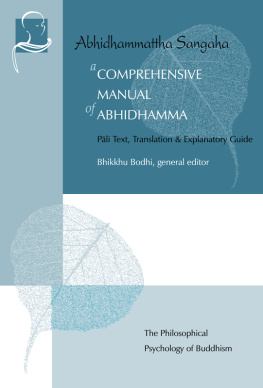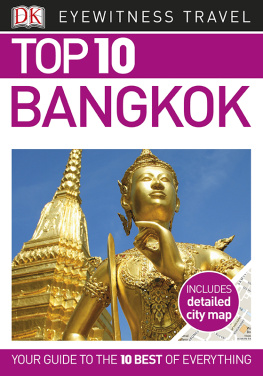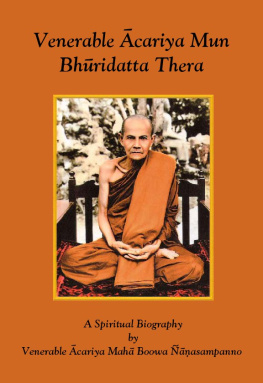Phra Ācariya Thoon Khippapañño - Buddho
Here you can read online Phra Ācariya Thoon Khippapañño - Buddho full text of the book (entire story) in english for free. Download pdf and epub, get meaning, cover and reviews about this ebook. year: 2009, genre: Religion. Description of the work, (preface) as well as reviews are available. Best literature library LitArk.com created for fans of good reading and offers a wide selection of genres:
Romance novel
Science fiction
Adventure
Detective
Science
History
Home and family
Prose
Art
Politics
Computer
Non-fiction
Religion
Business
Children
Humor
Choose a favorite category and find really read worthwhile books. Enjoy immersion in the world of imagination, feel the emotions of the characters or learn something new for yourself, make an fascinating discovery.
- Book:Buddho
- Author:
- Genre:
- Year:2009
- Rating:4 / 5
- Favourites:Add to favourites
- Your mark:
- 80
- 1
- 2
- 3
- 4
- 5
Buddho: summary, description and annotation
We offer to read an annotation, description, summary or preface (depends on what the author of the book "Buddho" wrote himself). If you haven't found the necessary information about the book — write in the comments, we will try to find it.
Buddho — read online for free the complete book (whole text) full work
Below is the text of the book, divided by pages. System saving the place of the last page read, allows you to conveniently read the book "Buddho" online for free, without having to search again every time where you left off. Put a bookmark, and you can go to the page where you finished reading at any time.
Font size:
Interval:
Bookmark:
Theauthor of this book is the abbot of a forest monastery in northeastThailand, and has traveled throughout Thailand, Europe, and theUnited States lecturing on Buddhism and meditation methods. Thisbook, Buddho, discusses the use of the word Buddho in Buddhistmeditation. The author differentiates between calm mind meditationand meditation practice, which develops wisdom as a key to the pathof Noble Fruition.
Theauthor discusses the history of the Lord Buddha and his search forthe path to enlightenment, pointing out his discovery of ineffectivemethods prior to discovering the development of wisdom through propermeditation methods and contemplative techniques, which ultimatelylead him to enlightenment.
Inyour own search for an effective way to rid your mind of defilementsand craving, consider the information provided by the author. Learnways of developing the right view, correct and effective meditationmethods, and things to avoid which will result in failure.
Translator
Ihave written this book, Buddho, so that readers will come tounderstand the correct meaning and use of the word Buddho.
Thereare those who wrongly believe that by just reciting the word
Buddhothey are able to rid defilements and cravings (kilesa)from their minds, then expecting wisdom to arise which wil enablethem to realize how thing really are (theTruth). However,just reciting repetitiously the parikammaword Buddho does not make one reach purity of mind (citta)and gain Noble Fruitions, and Nibbna.
Theuse of the word Buddho has two distinct applications in theseDhamma practices:
1.Samatha(tranquility meditation)
2.Vipassan(gaining wisdom)
Thesetwo types of Dhamma practice, samathaand vipassan,have different purposes and ways to practice. You will know andunderstand those differences by reading this book. Please read withrational discernment and come to the correct understanding.
Onceyou understand the correct meaning and use of Buddho,
Dhammapractice will not be confusing.
Inyour present life, if you have accumulated sufficient merit andvirtue (pram),you shall reach one of the four stages of Noble Fruitions. If not,you will reincarnate in the era of the next Lord Buddha, BuddhaMetteyya. You will listen to his Dhamma, develop wisdom and seethe Truth. You wil reach the ultimate state of Nibbna,becoming an arahant. In the present life, consider yourself as alucky person to become a Buddhist disciple.
Donot let this good opportunity go by. Put forth great effort topractice Dhamma and strive to accumulate merit and virtue. If youmiss this good opportunity in the present life, it is uncertain thatyou will reincarnate to become a Buddhist again as in the presentlife. In this life, you have responsibilities and work to do, so justkeep doing them as your duty. As your special task, keep practicingDhamma and accumulate virtue and merit, for these will go with youwhen you pass away from this world. It will be the benefit of lifeand your real treasure.
Finally,my wish for you is that you gain discernment and wisdom to see thereal view of the Truth in this present life.
Phracariya Thoon Khippapao
Iwould like to explain to all Dhamma practicing disciples about theuse of the word Buddho, since nowadays there is much said aboutBuddho. Some interpret the meaning of the word
Buddhodifferently, causing confusion. I may explain in a roundaboutfashion, but if readers will concentrate and follow along, they wilcome to a clear understanding of the correct meaning and significanceof the word Buddho. The right meaning of Buddho, indeed,is according to the Lord Buddha.
Youwill learn the correct meaning by reading this book. Please read withrational discernment (satipa),because if you misinterpret the word Buddho, the way youpractice Dhamma will be the wrong way, deviating from what the LordBuddha taught.
Buddhoin its simplified meaning is the Lord Buddha. However, If youprogress to a higher study of it, Buddho does not simply referto the Lord Buddha directly. Buddho is a Pali word meaningenlightenment, awakening, and cheerfulness. Youll know about themeaning of enlightenment awakening and cheerfulness from reading thisbook. They are the pragmatic result of Dhamma practice. I would nowlike to review the initial development of
Buddhofrom the beginning.
Inthe Lord Buddhas time, before the Lord Buddha had gainedenlightenment, Siddhattha Bhikkhu was his name. He left his householdand became self-ordained. He sought a Dhamma teacher in order tolearn the right Dhamma practice to find the way to surcease orovercome birth, deterioration due to aging, ailments, and death. Hedid not know the right Dhamma practice at that time.
SiddhatthaBhikkhu came to hear of two hermits, Uddaka tpasa and Alara tpasa.He heard of their strict practice and faith reputation and decided tobe their disciple. He quickly learned what they taught him.Meditation was their only practice, emphasizing reaching tranquilityor calmness in mind. Each day and night, whether standing, walking,sitting, or lying down, they meditated mindful meditation (satisamdhi) inorder to keep their minds calm continuously. They did not practice inthe training of mindfulness and wisdom (satipa) at all.Siddhattha Bhikkhu meditated very well until reaching the state ofthe Fine-Material Sphere (rpa-jhna)and the Formless Sphere (arpa-jhna).While his mind was in calmness, he felt as if the defilements(kilesa)and the cravings (tah)had left his mind.
Ashis mind withdrew from calm absorption (jhna),the result of his meditation (samdhi)was gaining inner happiness. Regression followed shortly after that,however, and the defilements and cravings became recurrent again,just as before.
Thispractice went on continuously for a very long time. Back and forthwent the repetitions of meditation and then recurrence of thedefilements and cravings, over and over again endlessly. Thus therewas no progression in Dhamma practice even though Siddhattha Bhikkhuhad developed the foundation for enlightenment, that being perfectmindfulness and wisdom (satipa),which in conjunction with replete accumulation of merit and the fulldevelopment of virtue (pram)had risen to great wisdom (padhika).
Havingthe fullness of mindfulness and wisdom, skil ful expertise inreaching the states of the Fine-Material Sphere and the FormlessSphere in meditation, Siddhattha Bhikkhu could reach and withdraw themind at every state of absorption (jhna)during meditation (samdhi).So why didnt wisdom for enlightenment occur while he wasmeditating at any of those states?
Allmeditation teachers and disciples should study the biography of theLord Buddha well, otherwise they might unwittingly formmisconceptions about the Lord Buddhas teaching. If there is justone teacher who through improper study forms the wrong view, thenthat teacher will teach many followers the wrong view and the wrongpractice. Teaching that wisdom (pa)arises from meditation which calms the mind is a misconception.Teachers should study well the Lord Buddhas meditation method.
Nowadaysthere are many teachers following the hermits
meditationmethods, but they say that they follow the Lord Buddhas path. Theyare not right saying that, for there is more to the Lord Buddhaspath than just samdhi.However, Siddhattha Bhikkhu did do this meditation with the twohermit teachers, so Buddhist disciples should study it and understandit.
Font size:
Interval:
Bookmark:
Similar books «Buddho»
Look at similar books to Buddho. We have selected literature similar in name and meaning in the hope of providing readers with more options to find new, interesting, not yet read works.
Discussion, reviews of the book Buddho and just readers' own opinions. Leave your comments, write what you think about the work, its meaning or the main characters. Specify what exactly you liked and what you didn't like, and why you think so.

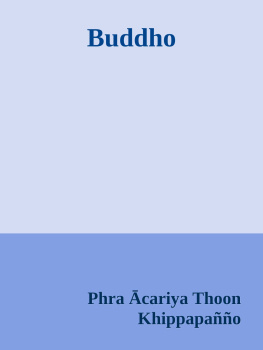



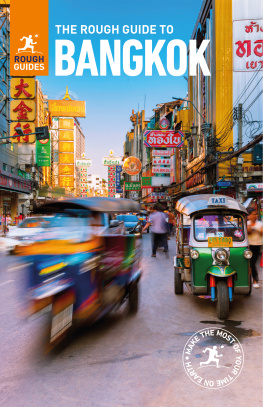
![Venerable Acariya Thoon Khippapañño - Traverse the Current [Crossing the Stream]](/uploads/posts/book/258699/thumbs/venerable-acariya-thoon-khippapa-o-traverse.jpg)



